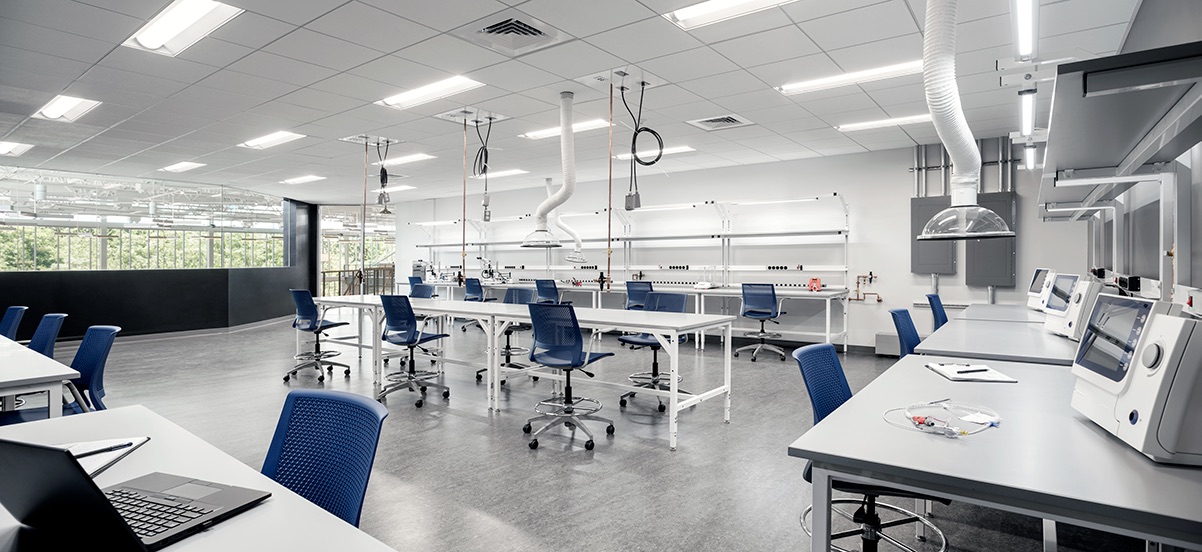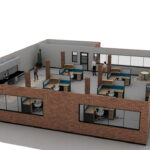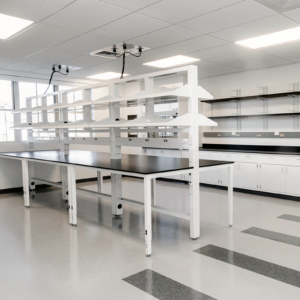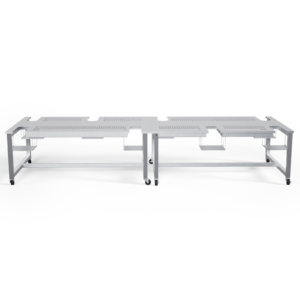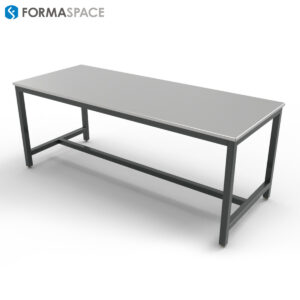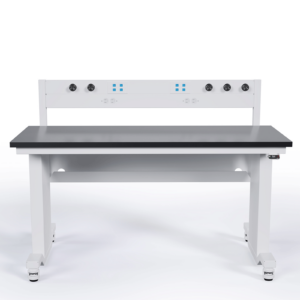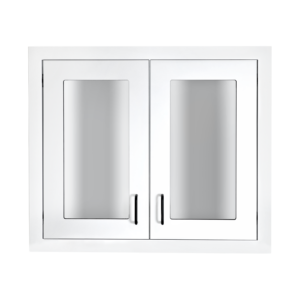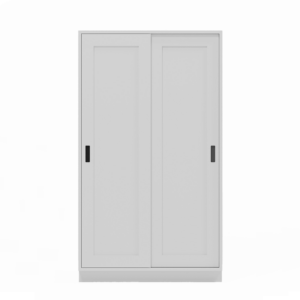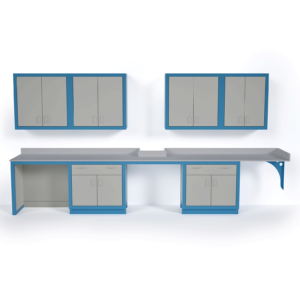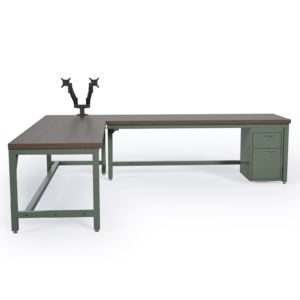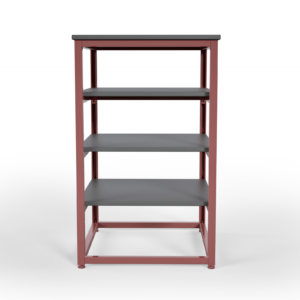Need to know which type of countertop material is recommended for your laboratory application?
In the following sections, we review the most common types of laboratory work and discuss the best recommended type of countertop.
Remember, it may be advantageous to choose different countertop materials even within one laboratory to provide the best performance for each of your different lab operations.
Wet Labs Handling Harsh Chemicals or High Heat Applications
· Epoxy Resin Countertops are a Top Recommendation
If your laboratory is handling a wide range of chemicals, including corrosive chemicals and reagents, or you will be working with oils, solvents, and industrial chemicals, then epoxy resin countertops are a top recommendation.
The epoxy resin material is extremely durable and can stand up to heavy use. It is resistant to staining and abrasions. It’s also non-porous and doesn’t absorb moisture, which increases its useful life.
Epoxy resin countertops are also capable of withstanding higher temperatures or exposure to open flames, making them a good choice for chemical labs, either in a corporate lab or a university research setting.
Be advised when specifying epoxy resin countertops that the material is relatively heavy, so it may require a more substantial support structure. Epoxy resin countertops are also relatively expensive due to their manufacturing processes and transportation costs.
If you are looking for an alternative to epoxy resin, consider phenolic resin or stainless steel.
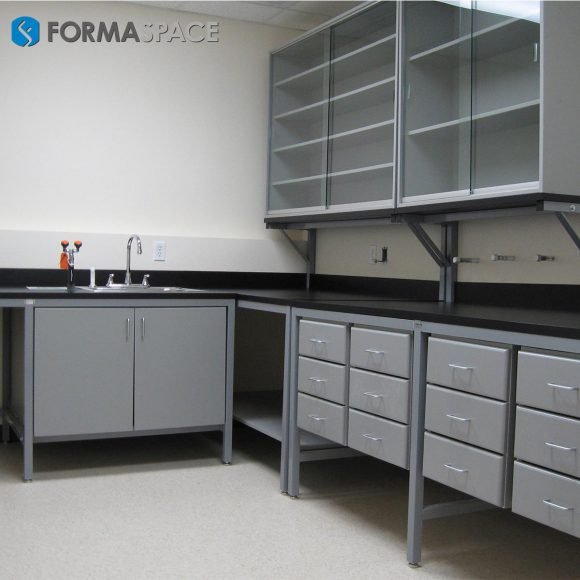
Laboratories Working with Organic Clinical Samples, including Harmful Pathogens
· Phenolic Resin Countertops are a Top Recommendation
Phenolic countertops are a recommended choice for laboratories with less exposure to harsher chemicals or high heat.
Like epoxy countertops, phenolic resin is a non-porous material, and it resists fungal and bacterial growth, making it an ideal choice for handling organic clinical samples, including potentially dangerous pathogens.
This combination makes phenolic resin countertops a recommended option for a variety of healthcare settings (including clinical testing labs, veterinary labs, microbiology labs, and dentistry labs). Phenolic resin countertops are also well suited for agricultural labs, forensic labs, and educational labs that don’t work with harsh chemicals/solvents or are subject to high heat exposure.
Phenolic resin countertops are lighter weight than epoxy resin ones, meaning they don’t require a heavy-duty support structure underneath. They also tend to be less expensive than epoxy resin countertops.
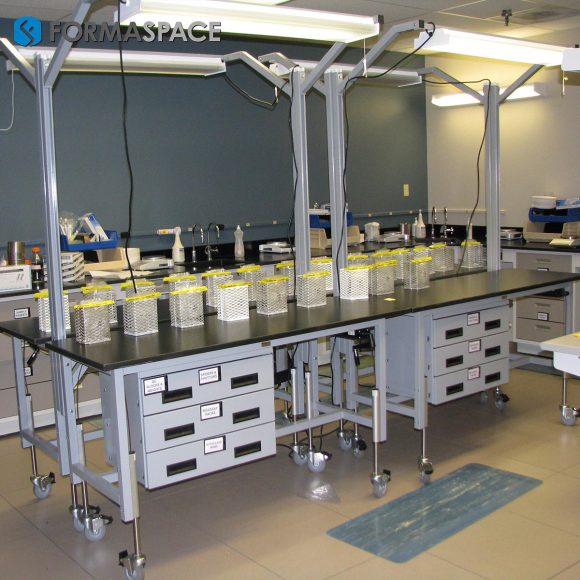
Clean Room Facilities, such as Chip Wafer Fab Laboratories
· Stainless Steel Countertops are a Top Recommendation
Clean room environments, such as microchip wafer fabrication laboratories or high-security bio-safety laboratories, must meet stringent standards to eliminate microparticles from the lab environment.
High-end clean room facilities typically rely on custom fabricated stainless-steel furniture (including countertops) because stainless is easy to clean and sterilize; its inherent anti-microbial properties also help prevent any unwanted bacterial or fungal growth that could contaminate the clean room environment.
Stainless steel countertops in clean room settings are also non-corrosive, and the material’s smooth surface does not attract or shed microparticle particles.
One of the concerns when specifying stainless steel countertops for clean room laboratories is that it’s relatively easy to scratch or dent the material if it’s abused. Strong solvents and acids can also damage the surface of stainless steel countertops.
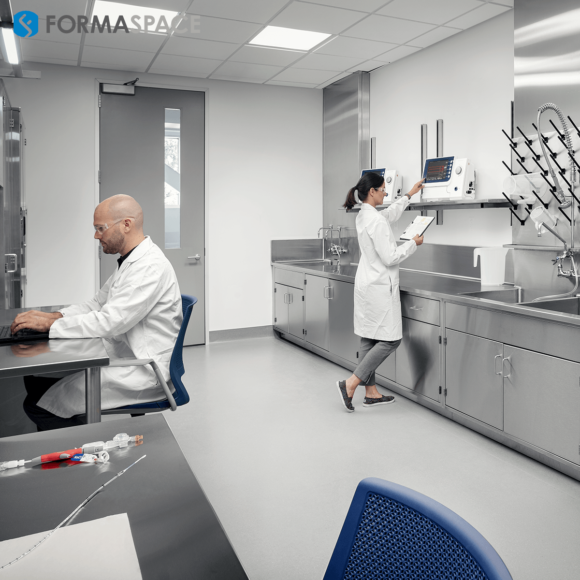
Sterile Lab Environments, such as Food Testing Laboratories
· Stainless Steel Countertops are a Top Recommendation
Laboratories that need to maintain sterile conditions, such as food and beverage testing labs, pharmaceutical labs, clinical testing labs handling dangerous pathogens, and biotech or healthcare settings, often choose stainless steel countertops due to their inherent anti-microbial properties.
Stainless steel is easy to sanitize and offers good resistance to medium chemical exposure. It’s also a strong, durable material that does not corrode, allowing stainless steel to provide an exceptionally long service life.
There are some issues to be aware of. It’s possible to scratch stainless steel surfaces (although these scratches can be buffed out in many cases); it’s also possible to abuse stainless steel surfaces by hitting them, which can cause dents. Finally, it’s important to be careful to avoid exposing stainless steel countertops to strong acids or solvents, as this can damage the surface.

Electronic Testing Labs Handling Sensitive Microelectronics
· Electrostatic Discharge Prevention Kit Countertops are a Top Recommendation
Microelectronics are very susceptible to accidental damage due to inadvertent exposure to static electric discharge, more commonly called static electric shock.
Even small electric discharges – often unnoticed by workers – can cause damage to microcircuits. In some cases, the damage can be detected immediately when testing a device exposed to static electricity, but a failure might also present itself in the future – once a product is in a consumer’s hands, for example.
To prevent this from happening, electronic testing labs and other facilities that handle microelectronics (such as electronics factory assembly lines or repair labs) must equip their workers with ESD (electrostatic discharge) protection measures. Typically, these involve workers wearing a wrist strap connected to an electric ground and covering the work surface with a so-called ESD protection mat to prevent transmission of wayward electric discharges.
Fortunately, Formaspace has a more modern alternative to ESD mats. The Formaspace countertops equipped with ESD kits have ESD protection built into the countertop material itself. This avoids workers having to wrangle with EDS mats on top of their working area.
The built-in Formaspace ESD solution is much more convenient to use (workers won’t forget to use a mat because the ESD protection is built into the work surfaces), and it eliminates the need to constantly replace ESD mats that wear out with use.
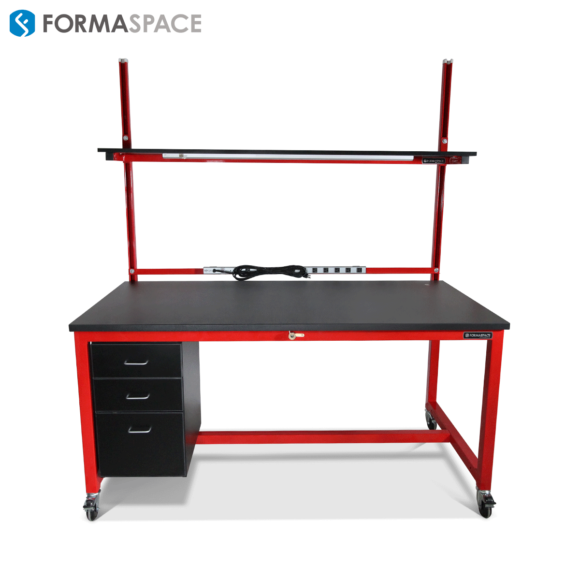
Formaspace is Your Laboratory Partner
Evolving Workspaces. It’s in our DNA.
Talk to your Formaspace Sales Representative or Strategic Dealer Partner today to learn more about how we can work together to make your next construction project or remodel a success.


